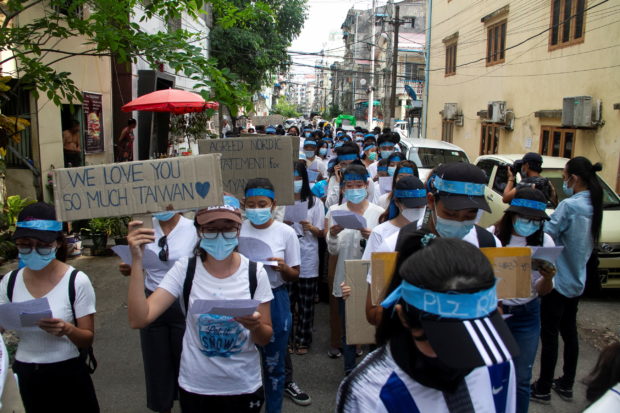Myanmar activists cancel new year festivities, hold silent protests

Demonstrators march during a protest against the military coup in Yangon, Myanmar April 12, 2021. REUTERS/Stringer
Opponents of military rule in Myanmar canceled traditional new year festivities on Tuesday and instead showed their anger at a February 1 coup through silent displays of defiance and small protests across the country.
The five-day New Year holiday, known as Thingyan, is usually celebrated with prayers, ritual cleaning of Buddha images in temples, and high-spirited water-dousing on the streets.
“We do not celebrate Myanmar Thingyan this year since over 700 of our innocent brave souls have been killed,” said one Twitter user named Shwe Ei.
Women wearing fine clothes for the most important holiday of the year protested on Tuesday holding traditional pots containing seven flowers and sprigs that are displayed at this time.
Many people painted the protesters’ three-finger salute on their Thingyan pots.
Small protests were held in numerous towns, according to images posted by media. In some places, people set out dozens of Thingyan pots daubed with messages such as “Save Myanmar” in silent shows of opposition to the military.
There were no immediate reports of violence but information has become scarce because of the junta’s curbs on broadband internet and mobile data services.
A spokesman for the junta could not be reached for comment.
Activists have called for similar protests throughout the holiday, which runs until Saturday, keen to maintain the momentum of their campaign.
This was the second year in a row the new year festivities were called off. Last year, it was because of the novel coronavirus.
“We cannot enjoy this year. We will celebrate once we get democracy,” said another Twitter user, Su Su Soe.
The February coup has plunged Myanmar into crisis after 10 years of tentative steps toward democracy.
Opponents of military rule have staged daily protests and workers in many sectors have gone on strike, bringing the economy to a standstill.
The security forces have responded with force, killing 710 protesters since the coup, according to a tally by the Assistance Association for Political Prisoners (AAPP) activist group.
Despite the violence, people return to the streets day after day, demanding an end to military rule and the release of the leader of the ousted government, Nobel laureate Aung San Suu Kyi.
The military says it had to overthrow her government because a November election again won by Suu Kyi’s National League for Democracy was rigged. The election commission dismissed the accusation.
Suu Kyi, 75, who has led Myanmar’s struggle against military rule for decades and who won the Nobel Peace Prize in 1991, has been detained since the coup and charged with various offenses. These include violating a colonial-era official secrets act that alone could see her jailed for 14 years.